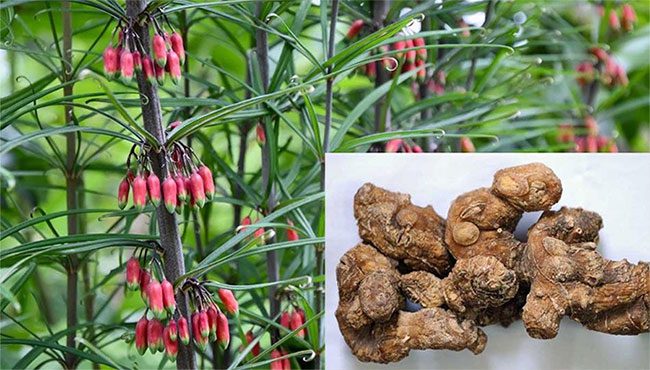This root vegetable is commonly found in the northern regions of Vietnam and has numerous health benefits, including stabilizing blood sugar levels.
What is Polygonatum?
Polygonatum, scientifically known as Polygonatum sibiricum, Polygonatum cyrtonemum, Polygonatum kingianum, belongs to the lily family (Liliaceae). In Vietnam, it is also referred to by various names such as red-flowered Polygonatum, sticky rice plant, mễ phủ, or cứu hoàng thảo. This plant has a slender stem that typically grows to a height of about 50 to 80 cm, with oval-shaped leaves. When in bloom, its flowers resemble hanging bells, with flower stalks measuring around 1.5 to 2 cm, usually flowering between March and April each year. The root of the Polygonatum is rough in texture, with many roots resembling ginger or Korean ginseng.
In Vietnam, Polygonatum is commonly found in moist forests, particularly in mountainous regions with green stones in northern provinces such as Sapa – Lao Cai, Lai Chau, and Ha Giang.
The preparation of Polygonatum is not overly complex. Typically, the roots are sun-dried and then dehydrated. Some people soak the roots in alcohol, slice them thickly, and then dry them to preserve.

This plant has a slender stem that typically grows to a height of about 50 to 80 cm, with oval-shaped leaves.
According to traditional medicine, Polygonatum has a sweet taste and a neutral nature, which helps nourish the qi, support yin, strengthen the spleen, moisten the lungs, and benefit the kidneys, among other notable uses:
Benefits of Polygonatum
Stabilizes Blood Sugar and Prevents Diabetes
For individuals with type II diabetes, Polygonatum is effective in controlling blood sugar levels and insulin resistance. The root’s benefit arises from the saponin compounds which can reduce hyperglycemia and elevated lipid levels in the blood. Additionally, Polygonatum contains fiber that helps reduce appetite, thus aiding in weight management.
Regulates Lipid Disorders
In addition to lowering blood sugar, Polygonatum can also regulate lipid disorders and associated diseases. It can inhibit the increase of total cholesterol and triglycerides in the liver and blood caused by a high-fat diet. Its mechanism of action involves adjusting endogenous metabolites in blood samples, urine, and liver.
Antibacterial Properties
Research on guinea pigs has shown that Polygonatum can inhibit bacterial growth and improve health. Some active compounds with antibacterial and anti-inflammatory properties in this plant include: isoflavonoids, salicylic acid, 5-hydroxymethyl-2-furancarboxaldehyde, and liquiritigenin, which help protect the liver and have antioxidant and antifungal effects.
Heart Health Benefits
Doctors indicate that Polygonatum extract can enhance healthy blood flow, and higher doses have a counteracting effect on experimentally induced myocardial ischemia. Thus, experts recommend that individuals with diabetes, poor digestion, and heart disease can prepare Polygonatum as a beverage or food supplement.
Some medicinal dishes that can be prepared with Polygonatum roots include: sticky rice porridge with Polygonatum, Polygonatum stew with pig pancreas, Polygonatum and mountain herbs stew with chicken, and Polygonatum stew with lean meat.



















































